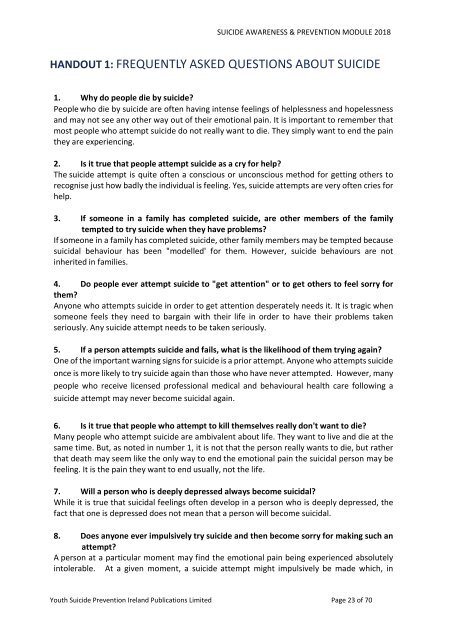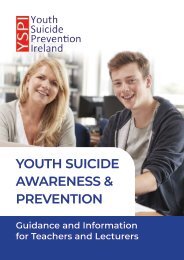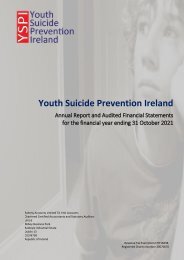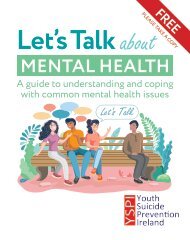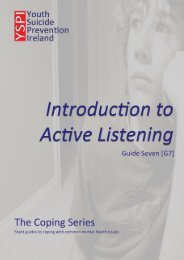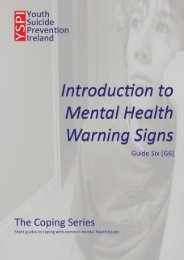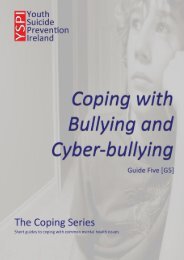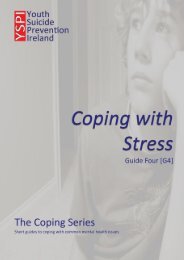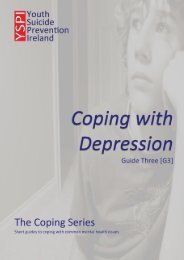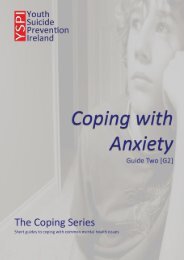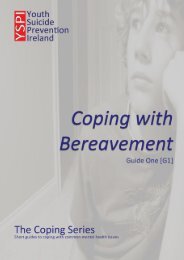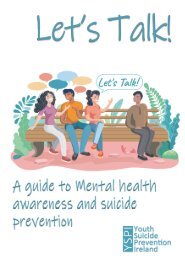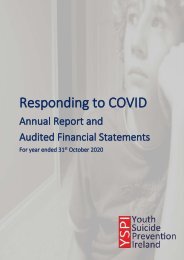Teaching Suicide Awareness and Prevention 2019
Lesson Plans, Worksheets and Quizzes for Secondary School Teachers
Lesson Plans, Worksheets and Quizzes for Secondary School Teachers
Create successful ePaper yourself
Turn your PDF publications into a flip-book with our unique Google optimized e-Paper software.
SUICIDE AWARENESS & PREVENTION MODULE 2018<br />
HANDOUT 1: FREQUENTLY ASKED QUESTIONS ABOUT SUICIDE<br />
1. Why do people die by suicide?<br />
People who die by suicide are often having intense feelings of helplessness <strong>and</strong> hopelessness<br />
<strong>and</strong> may not see any other way out of their emotional pain. It is important to remember that<br />
most people who attempt suicide do not really want to die. They simply want to end the pain<br />
they are experiencing.<br />
2. Is it true that people attempt suicide as a cry for help?<br />
The suicide attempt is quite often a conscious or unconscious method for getting others to<br />
recognise just how badly the individual is feeling. Yes, suicide attempts are very often cries for<br />
help.<br />
3. If someone in a family has completed suicide, are other members of the family<br />
tempted to try suicide when they have problems?<br />
If someone in a family has completed suicide, other family members may be tempted because<br />
suicidal behaviour has been "modelled' for them. However, suicide behaviours are not<br />
inherited in families.<br />
4. Do people ever attempt suicide to "get attention" or to get others to feel sorry for<br />
them?<br />
Anyone who attempts suicide in order to get attention desperately needs it. It is tragic when<br />
someone feels they need to bargain with their life in order to have their problems taken<br />
seriously. Any suicide attempt needs to be taken seriously.<br />
5. If a person attempts suicide <strong>and</strong> fails, what is the likelihood of them trying again?<br />
One of the important warning signs for suicide is a prior attempt. Anyone who attempts suicide<br />
once is more likely to try suicide again than those who have never attempted. However, many<br />
people who receive licensed professional medical <strong>and</strong> behavioural health care following a<br />
suicide attempt may never become suicidal again.<br />
6. Is it true that people who attempt to kill themselves really don't want to die?<br />
Many people who attempt suicide are ambivalent about life. They want to live <strong>and</strong> die at the<br />
same time. But, as noted in number 1, it is not that the person really wants to die, but rather<br />
that death may seem like the only way to end the emotional pain the suicidal person may be<br />
feeling. It is the pain they want to end usually, not the life.<br />
7. Will a person who is deeply depressed always become suicidal?<br />
While it is true that suicidal feelings often develop in a person who is deeply depressed, the<br />
fact that one is depressed does not mean that a person will become suicidal.<br />
8. Does anyone ever impulsively try suicide <strong>and</strong> then become sorry for making such an<br />
attempt?<br />
A person at a particular moment may find the emotional pain being experienced absolutely<br />
intolerable. At a given moment, a suicide attempt might impulsively be made which, in<br />
Youth <strong>Suicide</strong> <strong>Prevention</strong> Irel<strong>and</strong> Publications Limited Page 23 of 70


